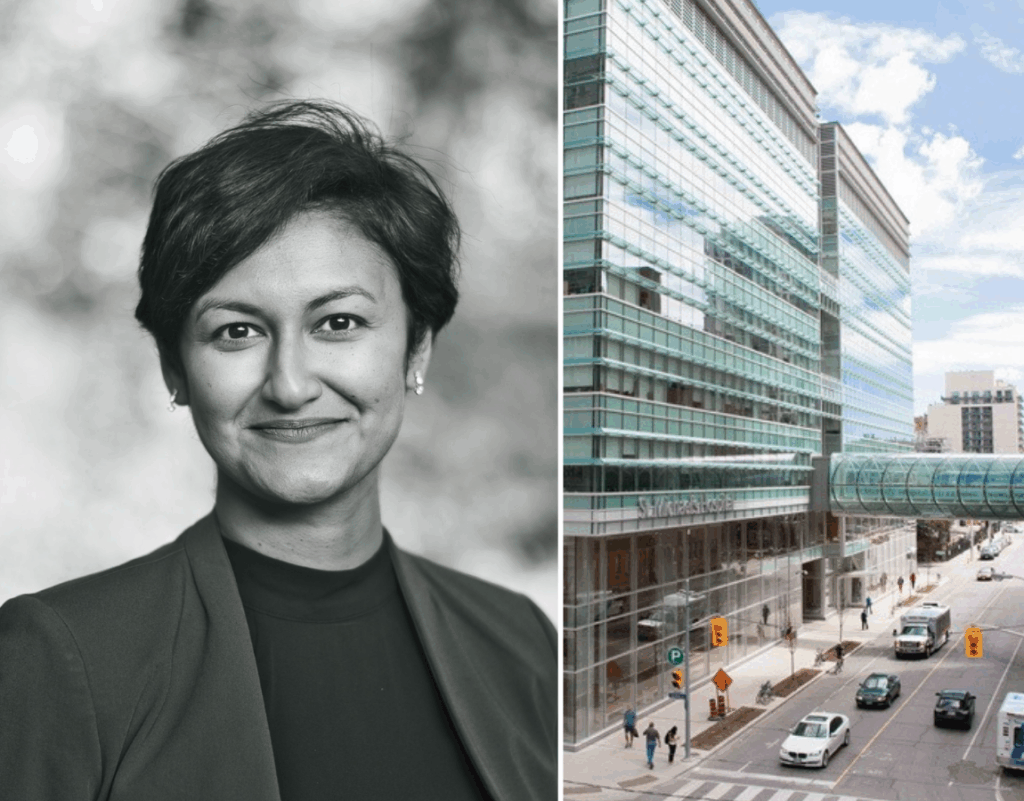Meet Dr. Gowri Gopalakrishna, 2025-2026 Scholar in Residence at Unity Health Toronto

Dr. Gowri Gopalakrishna, a scientist from Maastricht University in the Netherlands, has joined Unity Health Toronto as a 2025-26 Arthur S. Slutsky Scholar in Residence. Gopalakrishna has a background in epidemiology and focuses her work on research integrity. We recently sat down with her to learn more about her research, what she wants to accomplish while here, and what drew her to Unity Health Toronto.
Tell us about your research.
Gopalakrishna: I have a background in infectious disease epidemiology, having completed a Master’s degree from the London School of Hygiene and Tropical Medicine. I then completed a PhD in 2016, and since then I’ve been doing research focusing on knowledge translation – that is how you translate research into evidence-based policy.
In 2018, I ran a very large, first-of-its-kind study that looked at research behaviors in the academic community in the Netherlands. The goal of the study was twofold: 1) how frequently researchers engaged in misconduct and questionable research practices and 2) what might be some explanatory factors for these behaviours. To this day, it is still one of the largest studies in research integrity in the world.
This is what introduced me to the topic of research integrity, and it was really the start of my career in research integrity and topics related to it such as open science and reproducibility.
Can you explain what research integrity is?
Gopalakrishna: Research integrity is really looking at the professional best practices that a scientist may use, depending on which discipline they come from. So it’s asking, “What are the best practices so as to ensure that the research is of rigor and that it’s methodologically sound?”
Increasingly, research integrity is addressing issues of equity, diversity and inclusion (EDI).
Simply put, we realize that having research conducted by scientists that reflect the societies they’re trying to study is of increasing importance. Our research needs to reflect the diversity of our society to ensure that we produce research that is societally relevant. So increasingly my research is also focused on issues of EDI, and what kinds of impacts it has on research quality.
I conduct a lot of training with scientists, training them on how to conduct good quality research. I also increasingly do research on what we call “open science.”
Open science, which is gaining a lot of traction worldwide, particularly in Europe, is the principle that by making your research transparent and allowing others to scrutinize it, it can increase accountability and trustworthiness. Part of my focus is examining how the principle of open science intersects with issues of EDI.
A recent example is the issue of open-access journals, where the article processing fee is transferred to the scientists. While open-access journals allow people everywhere to freely read research, it transfers the financial burden to scientists, and this will impact researchers who don’t have access to funds to pay the processing fees. This can negatively impact researchers from low- and middle-income countries.
Enjoying this story? Sign up for the Unity Health Toronto newsletter, a monthly update on the latest news, stories, patient voices and research emailed directly to subscribers.
What drew you to Unity Health Toronto?
Gopalakrishna: I came to know Dr. Andrea Tricco (Director of the Li Ka Shing Knowledge Institute) through colleagues who co-edit The Journal of Clinical Epidemiology with her back home in Maastricht University. She became interested in the work I’m doing on research integrity and encouraged me to apply for the Scholar in Residence program and here I am.
I was drawn to come to Unity Health Toronto in part because of my own interest in understanding what kind of research integrity research and training does the UHT actually engage in, and where can I help to enhance the knowledge of best practices. We are also keen to write some grant applications together.
What do you hope to accomplish while you’re here?
Gopalakrishna: My time here will be in one six-week chunk followed by another week in October. Unfortunately, this is all the time I could afford being away which is actually such a privilege. For my first six weeks, I want to connect with as many researchers as possible who interface with the kind of research that I do. I hope to do lots of networking and connect and collaborate with researchers at Unity Health. I’ve started working collaboratively on a Horizon European grant application, which is one of the world’s largest research and innovation funding programs.
When I come back in October for a week, we’re going to have a Research Integrity Symposium, where I will give a keynote address. We’ll have a panel discussion and there will networking opportunities for researchers from across Unity Health.
What are your first impressions of Toronto?
Gopalakrishna: I’ve been to Canada before, but this is my first time in Toronto. I had two main impressions. First is the sheer number of skyscrapers! I’m from Singapore and it’s basically an urban jungle, but Toronto is a concrete jungle of another kind. Secondly, I’m very impressed by how cosmopolitan it is. The city is very diverse, and almost everyone I’ve met is from a different background and their families have settled here. The food choices are incredible!
